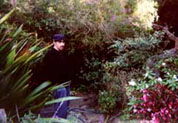
 Resource Center
Resource Center
Welcome | Frequently Asked Questions | Update | Bibliography | Links | Update Archive | tcboyle.com
 |
All
About
 Resource Center
Resource Center |
| Introduction
Frequently Asked Questions Biographical Info Novels Short Stories Non-Fiction Book Reviews by TCB Correspondence Anthologies Film & Video Audio Files & Recordings Interviews Critical Views Foreign Language Editions Online Resources Odds & Ends Readings & Tour Dates Reader Questions/Interpretations Acknowledgements - - - - -
|
Excerpted from POLITICS AND THE NOVEL: A SYMPOSIUMLos Angeles Times Book Review, August 13, 2000by T. Coraghessan BoyleI'm not sure why this should be,
but some of the most successful recent books of social engagement often
come from abroad. I think of J.M. Coetzee's stirring anti-apartheid novels,
"Waiting for the Barbarians" and "Life and Times of Michael K," both story-driven
and both set in an unfamiliar landscape that seems to materialize
out of a dream--or a nightmare--of his country of origin, South Africa.
Solzhenitsyn's "One Day in the Life of Ivan Denisovich," in contrast, is
very specific as to setting, but the political point emerges from the trials
of the protagonist and the deprivation he suffers, with only a mention
of the regime that exiled him to a Siberian labor camp. It is the force
of the fiction that brings the injustice to the fore, rather than the other
way round. To my mind, though, perhaps the most powerful piece of protest
writing in our time comes from an American playwright, Arthur Miller. I
can never see a production of "The Crucible" without soaring on the genius
of his conception. Here, on the face of it, is a wrenching drama
about accusations of witchcraft in
|